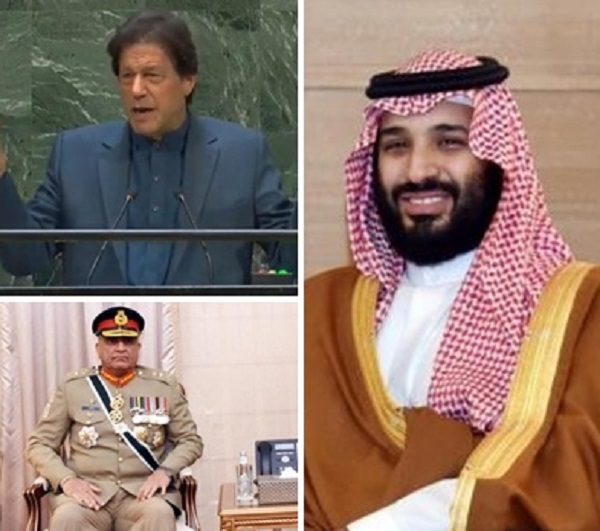New Delhi/Riyadh, (Samajweekly) After Crown Prince of Saudi Arabia Mohammed Bin Salman snubbed Pakistan Army chief Qamar Javed Bajwa, who was seeking to ease tensions between the two countries, Islamabad has begun to collude with the rival factions within the Saudi royal family.
Sources in Riyadh told IANS that Gen Bajwa who visited Saudi Arabia on Monday returned home without getting to meet the Crown Prince MBS. He had undertaken the visit as a damage control exercise after the Pakistan government threatened to split the Organisation of Islamic Countries (OIC) over Kashmir.
Recently Pakistan foreign minister Shah Mehmood Qureshi during a talk show on a Pakistani news channel had threatened that if the OIC headed by Saudi Arabia did not convene a foreign ministers’ meeting on Kashmir, Prime Minister Imran Khan would hold it on his own with his allies among the Islamic nations.
This irked Saudi Arabia, which has already been upset with Turkey’s President Recep Tayyip Erdogan’s threat to replace it as the leader of the Sunni Muslim world, with the support of allies like Pakistan and Malaysia.
Sources said that having been rebuffed by MBS, Islamabad engaged diplomatic channels to reach out to his rivals within the Saudi royal family who wish to supplant him.
As per the traditional Saudi system, succession passes between brothers, that is, among the sons of the kingdom’s founder Abdulaziz Ibn Saud. However, the system was changed in 2007 by King Abdullah, who set up an Allegiance Council, a family forum with the authority to choose the crown prince and appoint the next king.
The decision created a rift within the royal family. The sons of Princess Hussa bint Ahmed Al Sudairi, one of the influential wives of founder King Ibn Saud, felt it was done to deprive them of power.
As a result, when Abdullah died in January 2015, the Sudairi faction acted swiftly by sacking his sons, dismissing court officials and declaring Salman as the king. After the turmoil subsided and the kingdom stabilised in two years, Salman’s son MBS, was anointed as Crown Prince in 2017.
In the last three years, MBS, known for his progressive and pro-West outlook, has consolidated power in an unprecedented way. After he was declared Crown Prince, he had many of the country’s most influential businessmen detained. After centralising the decision-making authority, he launched a series of economic and social reforms in the country in view of the changing energy dynamics in the world.
He has taken several initiatives to reduce Saudi Arabia’s dependence on petrodollars as the US is rapidly becoming self-reliant in energy and scaling up its production. MBS is encouraging promotion of private sector with a focus on tourism and high skill based jobs in view of the young population, which forms a majority in the country.
Apart from that, MBS has earned a name for himself for opening up Saudi Arabia socially, with greater freedoms for women like the right to drive cars and to travel and work without the consent of a male guardian. The entertainment industry including music and sports, otherwise forbidden by conservative clerics, has also begun to thrive ever since MBS curbed their power with a legal order and several arrests.
However, the assassination of a Saudi Arabian dissident Jamal Khashoggi at the Saudi consulate in Istanbul in 2018 damaged the reputation of the Crown Prince, internationally. His rivals within the royal family, found the opportunity to intensify their opposition against King Salman and him.
The anti-MBS faction in the House of Saud, recently declared their support for King Salman’s brother Prince Ahmed and urged him to lead the country.
Sources said that Pakistan is now backing the Prince Ahmed faction in the Saudi royal family. However, 34-year-old MBS, as of today, continues to enjoy the support of the Saudi Army and intelligence besides the backing of the US President Donald Trump, sources said.










